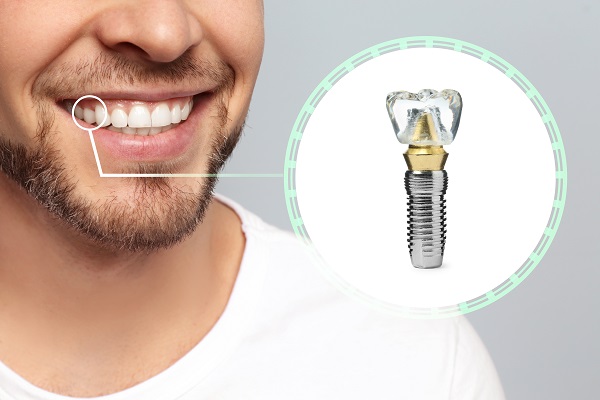Get a Dental Implant Restoration After Tooth Extraction

A dental implants restoration can replace a missing tooth that falls out naturally, gets knocked out or is extracted. A dental implant restoration is often recommended after tooth extraction, as it prevents bone loss from occurring and offers cosmetic and functional benefits.
Reviewing the purpose and benefits of a dental implant
There are several ways to replace a missing tooth after an extraction, including with a dental implant, partial denture or fixed bridge. The best way to determine which option works best for you is to discuss all three with a dentist. The following is a review of what a dental implant restoration is and when it might be the best solution.
The purpose of dental implant restoration
Dental implant restoration is a method of tooth replacement. Unlike dentures that are supported by the gums, a metal post is placed into the jawbone to serve as the root of the replacement tooth. This metal post is also called the dental implant. The purpose of the dental implant is to provide a more secure hold to the replacement tooth, and it is permanently fixed, whereas dentures are removable. A dental implant also preserves bone density after a tooth extraction.
The benefits of a dental implant restoration
The benefits often outweigh the potential drawbacks of dental implant restoration. The reasons to consider dental implant restoration include:
- Preserved jawbone density
- Improved appearance
- Increased confidence
- Fewer food restrictions
- Less ongoing maintenance
Many patients prefer a dental implant restoration over a denture or fixed bridge because they are easier to care for, require fewer food restrictions and prevent bone loss in the jaw. Essentially, you care for a dental implant restoration the same way that you would natural teeth.
When to choose a dental implant restoration
A dental implant restoration may be a better solution than dentures if the patient prefers a replacement solution that is non-removable and lasts longer. In fact, a dental implant restoration can last for more than 20 years if cared for properly. However, a dental implant restoration does require a more extensive process, which includes a minor surgical procedure to place the implant. Bone grafting is often necessary as well. Therefore, patients must be prepared mentally and physically to go through the treatment process, which typically takes around six months.
The importance of replacing a missing tooth promptly
There are cosmetic, functional and periodontal health benefits to replacing a missing tooth. The longer the patient takes to replace the tooth, the higher the likelihood that bone atrophy and bone loss will occur. By replacing a tooth promptly after extraction with a dental implant restoration, the patient does not have to worry about negative cosmetic consequences or oral health concerns related to the missing tooth.
Discuss dental implant restoration with our dental team
Dental implant restoration is a great way to improve your smile, oral health and function after tooth extraction. Our dental team can guide you through the treatment process, ensuring that you are comfortable and have answers to your questions along the way.
Request an appointment here: https://www.sylvadentist.com or call Sylva Family Dental at (828) 398-1879 for an appointment in our Sylva office.
Check out what others are saying about our dental services on Yelp: Dental Implants in Sylva, NC.
Recent Posts
An implant crown is an important part of dental implants. This is a cap that goes on the end of the implant, acting as the tooth. It is natural-looking in color, shape, and size. If you are missing a tooth, you should not have to live with a gap in your mouth. This treatment can…
Implant dentistry procedures have the highest rate of success among all the options available for replacing missing teeth. The process of replacing a single missing tooth is straightforward and involves using an implant as artificial tooth roots and supporting it with a dental crown. Continue reading to learn how the process works.Regardless of the number…
Without promptly getting a tooth fillings for a cavity, it can lead to other serious oral health issues, including tooth abscesses and tooth loss. Despite improvements in dental hygiene and oral care, tooth decay continues to be a major issue for children and adults alike. Therefore, it is necessary to visit the dentist regularly so…
Family dental care serves the primary oral healthcare needs of entire families. A family dentist can treat patients during any stage of life, making a family dentist someone who can provide dental care services for children and adults. Look for a family dentist who is trustworthy, dependable, and truly cares about your family's good oral…


